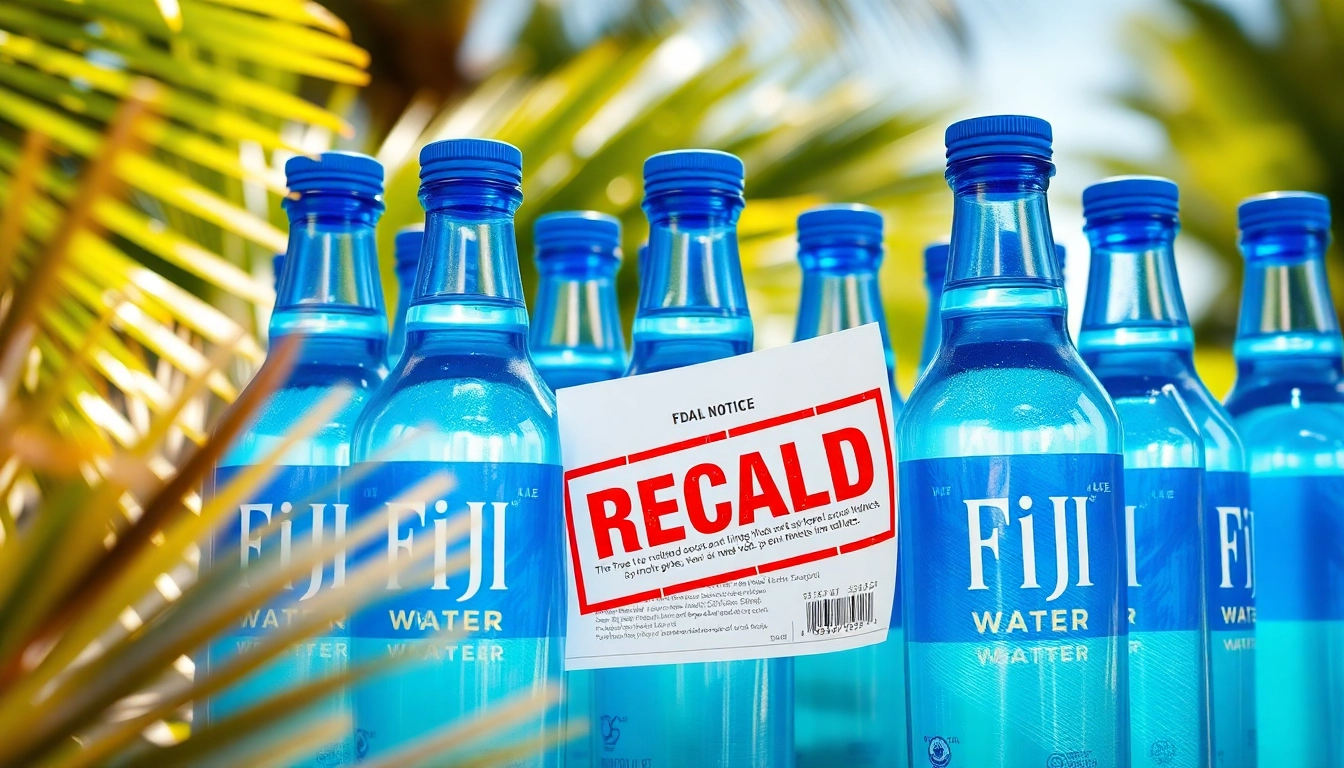
Overview of the Fiji Water Recall
On May 23, 2024, the U.S. Food and Drug Administration (FDA) announced a significant recall regarding Fiji Natural Artesian Water, involving a staggering 78,533 cases, which equates to approximately 1.9 million bottles. This recall was classified as a Class III recall, indicating that the issue posed a low risk of serious adverse health consequences but still warranted attention. The affected water was predominantly sold online, particularly through outlets like Amazon.com. As consumers become increasingly conscious about what they drink, this development raises several concerns regarding safety and quality, highlighting the importance of understanding the specifics behind the fiji water bottles recalled incident.
What Led to the Recall?
The impetus for the recall centered on concerns related to manganese contamination and the possible presence of specific bacterial genera in Fiji water. Manganese is a common element typically found in various soils and water sources, but excessive exposure can pose health risks to humans, particularly infants and young children. According to the Minnesota Department of Health, higher-than-normal levels of manganese can lead to neurologic issues and other health complications. The decision by Natural Waters of Viti Limited, the manufacturer of Fiji Water, to initiate this voluntary recall demonstrates a proactive approach to consumer safety. With an increasing number of recalls plaguing the bottled water industry, it underscores the need for stringent quality control measures.
Scope of the Recall: Numbers and Dates
The recall itself is comprehensive, affecting over 78,500 cases of Fiji water, specifically the 500 mL bottle size. Each case contained 24 bottles, illustrating the extensive impact of this incident on both retailers and consumers. The water bottles were primarily distributed through online platforms, raising questions about oversight and quality checks in e-commerce. The recall officially announced on May 23, 2024, was part of a broader effort by health regulators to maintain safety standards in the food and beverage industry.
Official Statements from Fiji Water
In response to the recall, representatives from Fiji Water expressed their commitment to consumer safety and transparency. The brand emphasized their dedication to high-quality standards and stated that all distributed products undergo rigorous testing to ensure safety. Moreover, they indicated that they are working closely with the FDA to address the situation and to prevent similar occurrences in the future. Such official statements are crucial in managing public perception and trust, particularly in the wake of a significant recall.
Health Implications of Consuming Recalled Bottles
Understanding health implications surrounding the consumption of recalled products is vital for informed decision-making. With concerns about manganese and bacterial contamination, consumers need clarity on the risks posed by the recalled Fiji water bottles.
Understanding Manganese Concerns
Manganese, while not harmful in trace amounts, can be detrimental when consumed in higher quantities. Exposures to elevated levels of manganese can lead to conditions such as manganism, which exhibits symptoms similar to Parkinson’s disease. Young children and fetuses are particularly vulnerable, as their developing nervous systems may be adversely affected. The Minnesota Department of Health has set a health-based guidance level for manganese in drinking water, underscoring the importance of monitoring exposure, especially from sources such as bottled water.
Bacterial Contamination Risks
The potential presence of bacteria in drinking water further complicates health implications. Bacteria can cause a myriad of health issues from gastrointestinal infections to more severe complications, particularly in individuals with compromised immune systems. The risk associated with bacterial contamination varies based on the specific types of bacteria present, with some being harmless, while others can be pathogenic. Overall, consumers should remain vigilant about drinking water quality.
Guidelines from Health Authorities
Health authorities recommend that consumers check their bottled water against recall notices and advisories. Additionally, any bottled water showing signs of contamination should not be consumed. In light of the Fiji water recall, individuals with bottles from the recalled batch should dispose of them safely to eliminate the risk of consuming contaminated water. Health departments stress the importance of being informed and proactive in addressing potential health risks associated with contaminated products.
How to Identify Affected Fiji Water Bottles
Identifying affected products is crucial for consumer safety. Here’s how to ensure that you do not have these recalled bottles in your possession.
Product Codes and Labels
Each case of affected Fiji Natural Artesian Water has specific identifiers that consumers should be aware of. The official recall notice provides specific product codes and label information. Consumers should look for labels featuring cases of the 500 mL bottles sold before the recall date of May 23, 2024. It’s prudent to match the labels with the recall announcements to pinpoint any affected products.
Where the Bottles Were Sold
The recalled Fiji water was primarily sold through online portals, especially Amazon.com. Retailers and distributors that might have stocked these cases include both large and small businesses operating in the e-commerce space. Consumers are encouraged to review their purchases and check against the recall lists provided by health authorities.
What To Do If You Have Recalled Bottles
For those who find they have acquired affected Fiji water bottles, the recommended action is to discontinue usage immediately. Consumers are advised to check for any specific return policies from retailers or the manufacturer. If purchased online, many retailers will facilitate refunds or exchanges for recalled products. Proper disposal of these bottles is also essential to ensure they do not pose any future health risks.
Impacts on Fiji Water Brand Reputation
The fallout from the recall has broader implications for the Fiji Water brand that extends beyond mere product safety. The effects of this incident could linger in the minds of consumers and impact their purchasing decisions.
Market Response to the Recall
The market’s response to the Fiji water recall was immediate and multifaceted. Rivals seized the opportunity to promote their own products as safer alternatives. A notable increase in inquiries and searches for competing bottled water brands can be correlated with the timing of the recall announcement. In an era where brand reputation can be fragile, this incident serves as a reminder of how product quality directly influences market dynamics.
Consumer Trust and Brand Loyalty
Consumer trust is paramount for any brand, especially in the food and beverage sector. The recall potentially jeopardizes long-established loyalty to Fiji Water. As consumers become more discerning about their health choices, past incidents can linger in the collective memory, affecting future purchasing decisions. Maintaining transparency and quick, effective communication during a recall can either mitigate or exacerbate these issues.
Future Implications for Fiji Water
Looking ahead, Fiji Water may need to invest in bolstering its quality control measures and enhancing consumer relations strategies. Addressing customer concerns effectively and visibly demonstrating compliance with health standards is essential for rebuilding trust. The brand’s future will depend on how well it learns from this incident and the initiatives it undertakes to safeguard its reputation.
Steps Taken by Fiji Water Post-Recall
In the wake of the recall, Fiji Water has expressed its intentions to take corrective actions aimed at ensuring consumer safety and regaining trust in the brand.
Quality Control Improvements
Responding to the issues raised by the recall, Fiji Water has implemented more stringent quality control measures, scrutinizing its sourcing and bottling processes. This includes enhancing their testing procedures to identify contaminants before products reach consumers. By focusing on comprehensive quality assurance protocols, the brand aims to prevent future occurrences that could compromise product integrity.
Transparency with Consumers
Transparency is a critical element in restoring consumer confidence. Fiji Water is encouraged to maintain open lines of communication regarding the recall process and ongoing safety measures. Regular updates to consumers about safety standards and product quality can assist in rebuilding trust among loyal customers and attracting new ones. This proactive approach in crisis management can help pave the way for smoother market recovery.
FDA Follow-ups and Compliance
After the recall, Fiji Water is required to comply with FDA regulations and follow-up assessments. Engaging with FDA representatives not only ensures adherence to legal standards but also signals to consumers that the brand is committed to rectifying its standards proactively. Regularly updating consumers regarding progress with the FDA will reflect the brand’s dedication to quality and safety.







